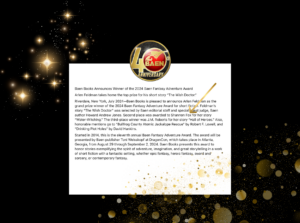Nineteen Eighty-four by George Orwell
Among the seminal texts of the 20th century, Nineteen Eighty-Four is a rare work that grows more haunting as its futuristic purgatory becomes more real. Published in 1949, the book offers political satirist George Orwell’s nightmare vision of a totalitarian, bureaucratic world and one poor stiff’s attempt to find individuality. The brilliance of the novel is Orwell’s prescience of modern life–the ubiquity of television, the distortion of the language–and his ability to construct such a thorough version of hell. Required reading for students since it was published, it ranks among the most terrifying novels ever written.
I’m not sure which novel was responsible for setting me on the path of a deep and abiding love for dystopia and post-apocalyptic futures. I know that it wasn’t Nineteen Eighty-Fourbecause I remember the first time I sat down to read this book thinking, “I’m going to love this book. This is everything I want in a novel.” And it was.

Nineteen Eighty-Fouris one of those novels that, in its very simplicity, takes hold of your mind like nothing else. They say it is a story of one man’s struggle to remain an individual in the face of Big Brother. I say it is a novel for humanity that remains as relevant as it was when it was published in 1949. The year 1984 has come and gone, but the threat of a Big Brother-like society is still very real. Many studies have notes how an increasingly technological society loses some of its individuality even as it becomes hyper-public: when one knows everything about a person at the click of a mouse, what is left to learn? Even elsewhere, we see the fingerprints of Big Brother: invasive governments, biased media, governments who want to strip the rights of the people as a way to keep them under their thumb. We see this around the world, but we even see it in the American government. Big Brother is not simply a fictional manifestation of 1949 or even 1984, but one of those transcendent figures whose has entered into the vernacular.
My main complaint about Nineteen Eighty-Four is that I wish it were longer. There is so much to this society that I wish Orwell had provided us more pages to roll around in. I’ve read this novel a handful of times, and each time I wish there were more. In some ways though, I imagine that as the beauty of the novel: A short parable which finds its extra pages of material in the fodder of global society.



